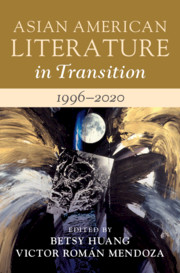16 results
11 - SF and the Weird
- from Part II - Genres
-
-
- Book:
- The Cambridge Companion to American Horror
- Published online:
- 21 July 2022
- Print publication:
- 04 August 2022, pp 169-182
-
- Chapter
- Export citation
Contents
-
- Book:
- Asian American Literature in Transition, 1996–2020
- Published online:
- 27 May 2021
- Print publication:
- 17 June 2021, pp v-vii
-
- Chapter
- Export citation
Copyright page
-
- Book:
- Asian American Literature in Transition, 1996–2020
- Published online:
- 27 May 2021
- Print publication:
- 17 June 2021, pp iv-iv
-
- Chapter
- Export citation
Part I - Neoimperialisms, Neoliberalisms, Necropolitics
-
- Book:
- Asian American Literature in Transition, 1996–2020
- Published online:
- 27 May 2021
- Print publication:
- 17 June 2021, pp 13-96
-
- Chapter
- Export citation
Bibliography
-
- Book:
- Asian American Literature in Transition, 1996–2020
- Published online:
- 27 May 2021
- Print publication:
- 17 June 2021, pp 346-378
-
- Chapter
- Export citation
Introduction
-
-
- Book:
- Asian American Literature in Transition, 1996–2020
- Published online:
- 27 May 2021
- Print publication:
- 17 June 2021, pp 1-12
-
- Chapter
- Export citation
Acknowledgements
-
- Book:
- Asian American Literature in Transition, 1996–2020
- Published online:
- 27 May 2021
- Print publication:
- 17 June 2021, pp xxii-xxiv
-
- Chapter
- Export citation
Index
-
- Book:
- Asian American Literature in Transition, 1996–2020
- Published online:
- 27 May 2021
- Print publication:
- 17 June 2021, pp 379-392
-
- Chapter
- Export citation
Contributors
-
- Book:
- Asian American Literature in Transition, 1996–2020
- Published online:
- 27 May 2021
- Print publication:
- 17 June 2021, pp ix-xii
-
- Chapter
- Export citation
Part IV - Movements, Speculations
-
- Book:
- Asian American Literature in Transition, 1996–2020
- Published online:
- 27 May 2021
- Print publication:
- 17 June 2021, pp 253-345
-
- Chapter
- Export citation
Part II - Intersections, Intimacies
-
- Book:
- Asian American Literature in Transition, 1996–2020
- Published online:
- 27 May 2021
- Print publication:
- 17 June 2021, pp 97-170
-
- Chapter
- Export citation
Series Preface
-
- Book:
- Asian American Literature in Transition, 1996–2020
- Published online:
- 27 May 2021
- Print publication:
- 17 June 2021, pp xiii-xxi
-
- Chapter
- Export citation
Part III - Genres, Modalities
-
- Book:
- Asian American Literature in Transition, 1996–2020
- Published online:
- 27 May 2021
- Print publication:
- 17 June 2021, pp 171-252
-
- Chapter
- Export citation
Illustrations
-
- Book:
- Asian American Literature in Transition, 1996–2020
- Published online:
- 27 May 2021
- Print publication:
- 17 June 2021, pp viii-viii
-
- Chapter
- Export citation

Asian American Literature in Transition, 1996–2020
-
- Published online:
- 27 May 2021
- Print publication:
- 17 June 2021
11 - Popular Genres and New Media
- from Part III - The Extravagance of Genre
-
-
- Book:
- The Cambridge Companion to Asian American Literature
- Published online:
- 05 September 2015
- Print publication:
- 20 August 2015, pp 142-154
-
- Chapter
- Export citation



